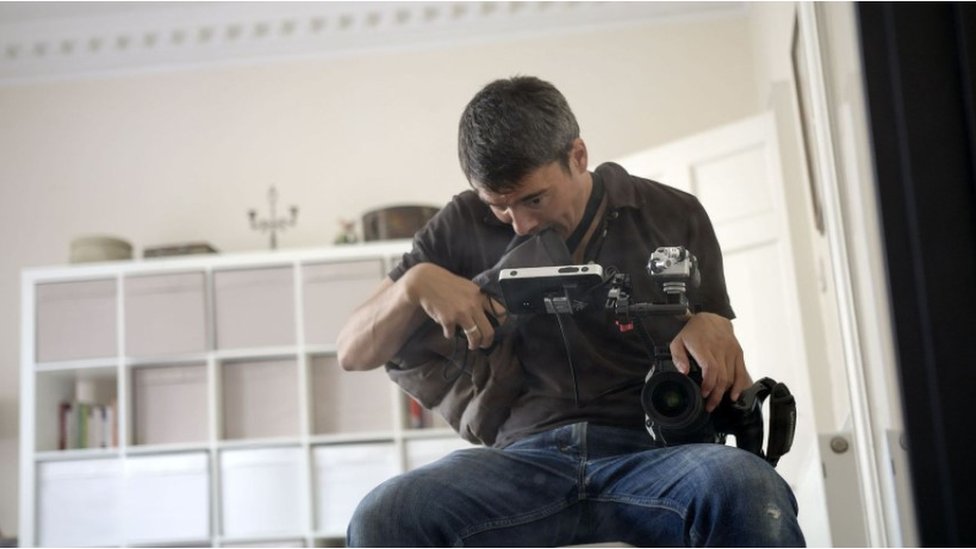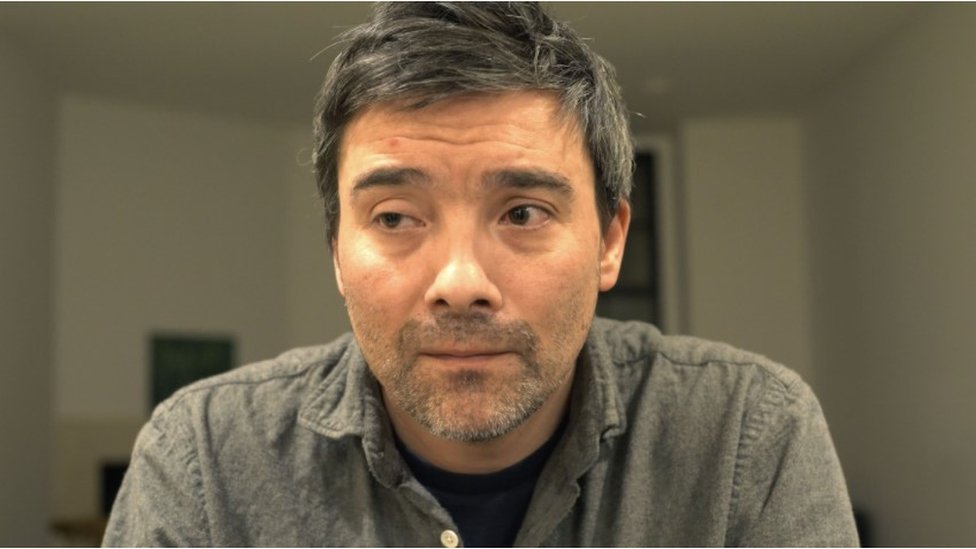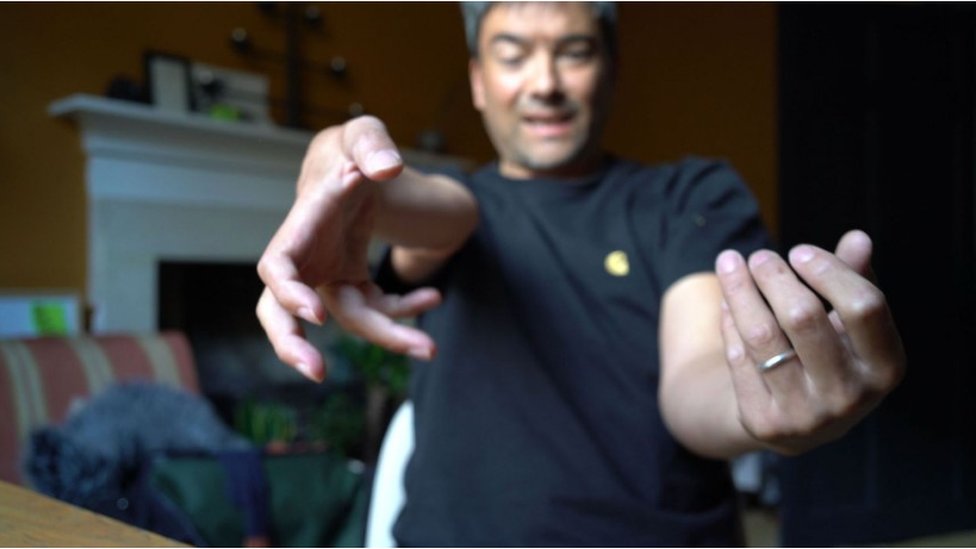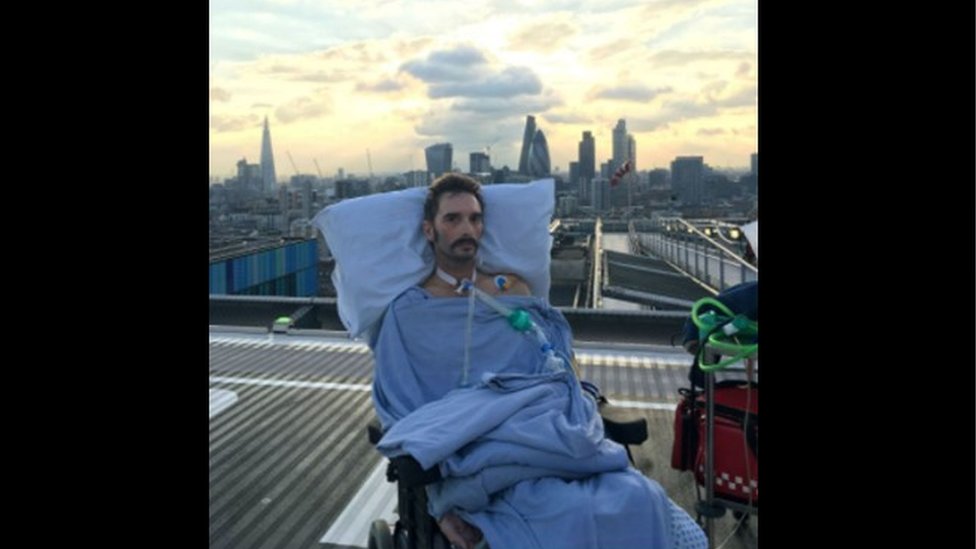
When I was diagnosed with a rare neurological illness, one I'd never heard of, the ground beneath me became unsteady.
The consultant told me the good news first - the illness is rarely fatal. But then the bad news came - no one knows exactly what causes it and there is no cure.
He couldn't tell me how it would ultimately affect me, only that it would keep getting worse and I would slowly lose the use of my hands, arms and legs.
In that instant, the world I knew changed.
I have multifocal motor neuropathy which belongs to a family of illnesses known as autoimmune peripheral neuropathies.
They cause the immune system to attack the insulation that covers our nerves - myelin - until the nerves can no longer transmit the brain's signals to the muscles. The result is what's known as flaccid paralysis where your limbs and face can become paralysed.

Guillain Barre Syndrome (GBS) is the most well-known of these conditions. Although rare, it can lead to people become locked into their bodies within days.
Their brain remains active, but their body is unable to move. They have no way to communicate even though they are fully present - all mind, no body, no outlet.
Fortunately, most people slowly emerge from this locked-in state and regain the use of their body. Some recover completely, others may have to use a wheelchair or rely on a tracheostomy to breath.
In a way, their recovery is the exact opposite of what is happening to me. Rather than the catastrophic, rapid paralysis, I have a slow decline as my arms and legs become paralysed.
The first symptom I felt was a slight numbness and tingling in my toes, then my fingers.
My legs were the first limbs to be affected. Now both are weak and walking is becoming difficult.
I'm right-handed but I can barely use it. Most of my strength and fine motor skill is gone. I can't hold my camera steady, I can't write legibly and if I exert myself even lightly I get so tired I need to rest. Worryingly, the weakness has started in my left hand too.

I was diagnosed 12 years ago when I was 30. As well as impacting my future I knew it would alter my wife, Anna's, and our children's futures too. So I did what a lot of people in my position do (especially men) - I refused to talk about it.
I became an expert at dodging questions and relied on stock answers: "I don't know", "I'm fine", "Don't worry about it". I fended away most of the enquiries, until, eventually, everybody stopped asking.
For a decade I kept my fears a secret - What would my future be? Would I need care? What are the implications for my family?
But of course, the illness didn't disappear. It grew until two years ago I could no longer ignore it - I couldn't hold my camera. Did that mean the end of my career?
For the past 15 years I've made documentaries for the BBC.
I always told contributors - often as they went through huge personal turmoil - that the process would be cathartic. That it would help them make sense of what they were going through.
So Anna suggested I make a film about my illness - maybe it would force me to confront it and open up.
The day I decided to make
Locked In: Breaking the Silence was the moment I realised I did need help and support.I started by finding people affected by GBS in the hope they might help me understand my condition.

This was when the full impact of the illness hit home. While they had a turbo version of peripheral neuropathy which paralysed them completely before they slowly started to recover, I would continually decline.
One person I met was Scott who was in his early 40s. He had been enjoying his last night of a European trip when he felt tingling in three fingers.
Within 32 hours he was in intensive care and on a ventilator, unable to move his body or breath for himself. He still had full brain activity.
He spent two years in a care home while he recuperated and is now living in his own flat and able to get around in a wheelchair.
In the UK, hospitals may only see one or two cases of GBS a year. I wanted to meet someone in the midst of an acute attack and after nearly 12 months, I finally got a call to meet Rob.
He was in his 70s and had been active. He too had experienced tingling in his fingers and within a week he was paralysed and only able to communicate by blinking.
For Rob this meant his life was hanging by a thread, his ability to make decisions resided in just the blink of an eye. For me it rammed home the importance of communication.
There is a key difference between Scott and Rob's illness and my own - although there is no cure for mine there is a treatment that temporarily halts its progress.
Intravenous immunoglobulin or IVIG, made from the blood of thousands of donors, contains millions of healthy antibodies which are injected into me to temporarily reset my immune system. It stops the onslaught on my nerves. It comes in bottles and every three weeks I have seven of them.
It works for a couple of weeks, then my immune system's rogue cells start to take over - my arms and legs get weak, I start to drop things, I can barely hold my camera and I get so tired that I feel like I could sleep for days.
One day the treatment may stop working, but for now it is my lifeline.
Making this film forced me to confront my illness. It also made me open up with my family in a meaningful way. I knew my son Louis, 11, and my 14-year-old daughter Ami had questions, but I had never been open to answering them before.
This is where I discovered starring in documentaries really is cathartic and showed me why we should talk with our nearest and dearest when life throws us a curve ball.
When Louis asked me if he would also get my condition, I realised why it was so important to let my kids ask the questions that were on their minds. I could tell him he is at no greater risk of getting it than anyone else.
Now their questions are finally spoken we all feel more comfortable as a result.
Although we still have big uncertainties about my illness at least we can discuss and share the future together. And now my illness has an identity, I can feel it, I can accept it, I can get angry with it but more than anything, I can live with it.

"condition" - Google News
December 04, 2020 at 07:50AM
https://ift.tt/39Kdf3l
'The rare condition slowly paralysing my arms and legs' - BBC News
"condition" - Google News
https://ift.tt/2W6ON50
https://ift.tt/2L1ho5r
Bagikan Berita Ini

















0 Response to "'The rare condition slowly paralysing my arms and legs' - BBC News"
Post a Comment